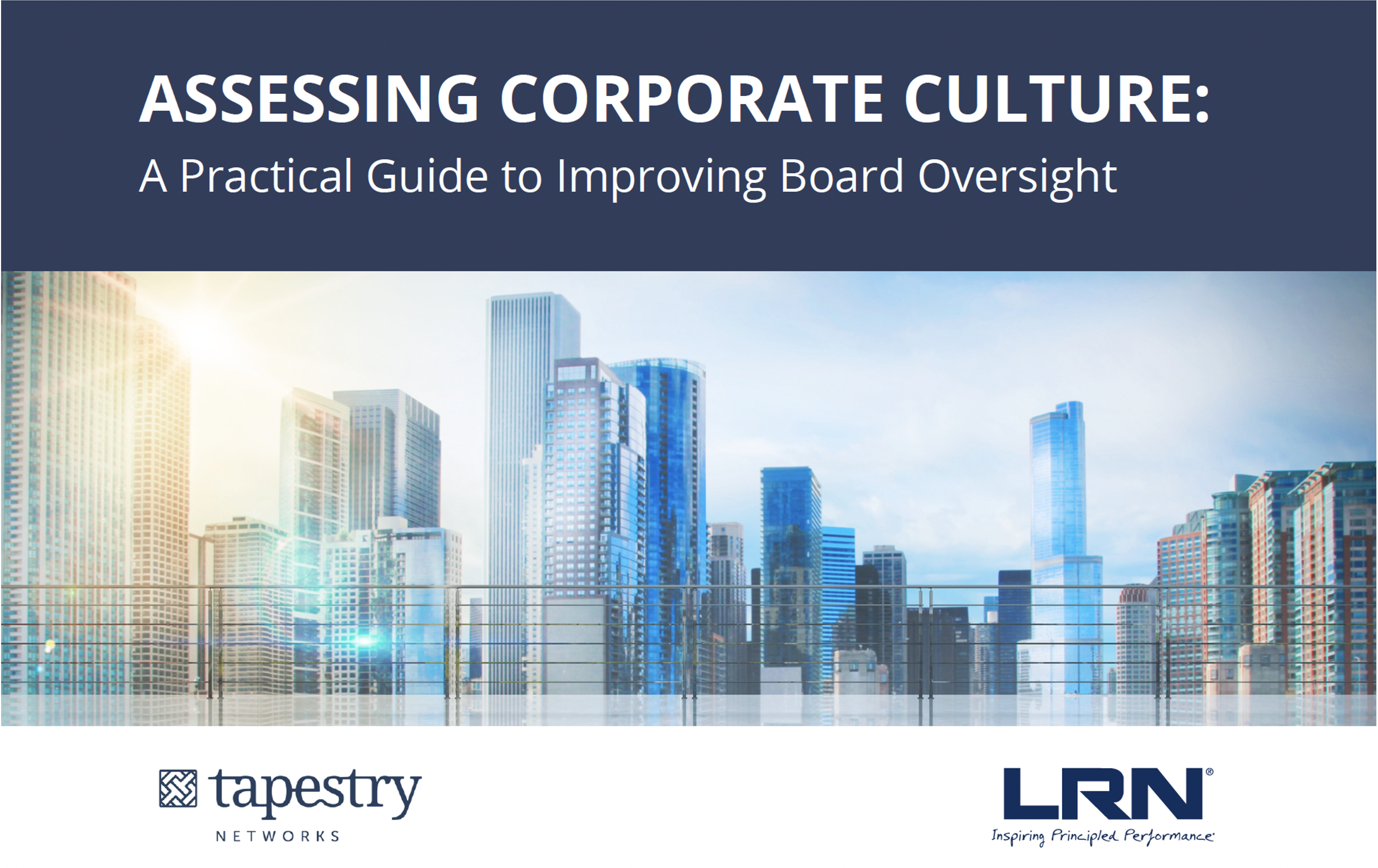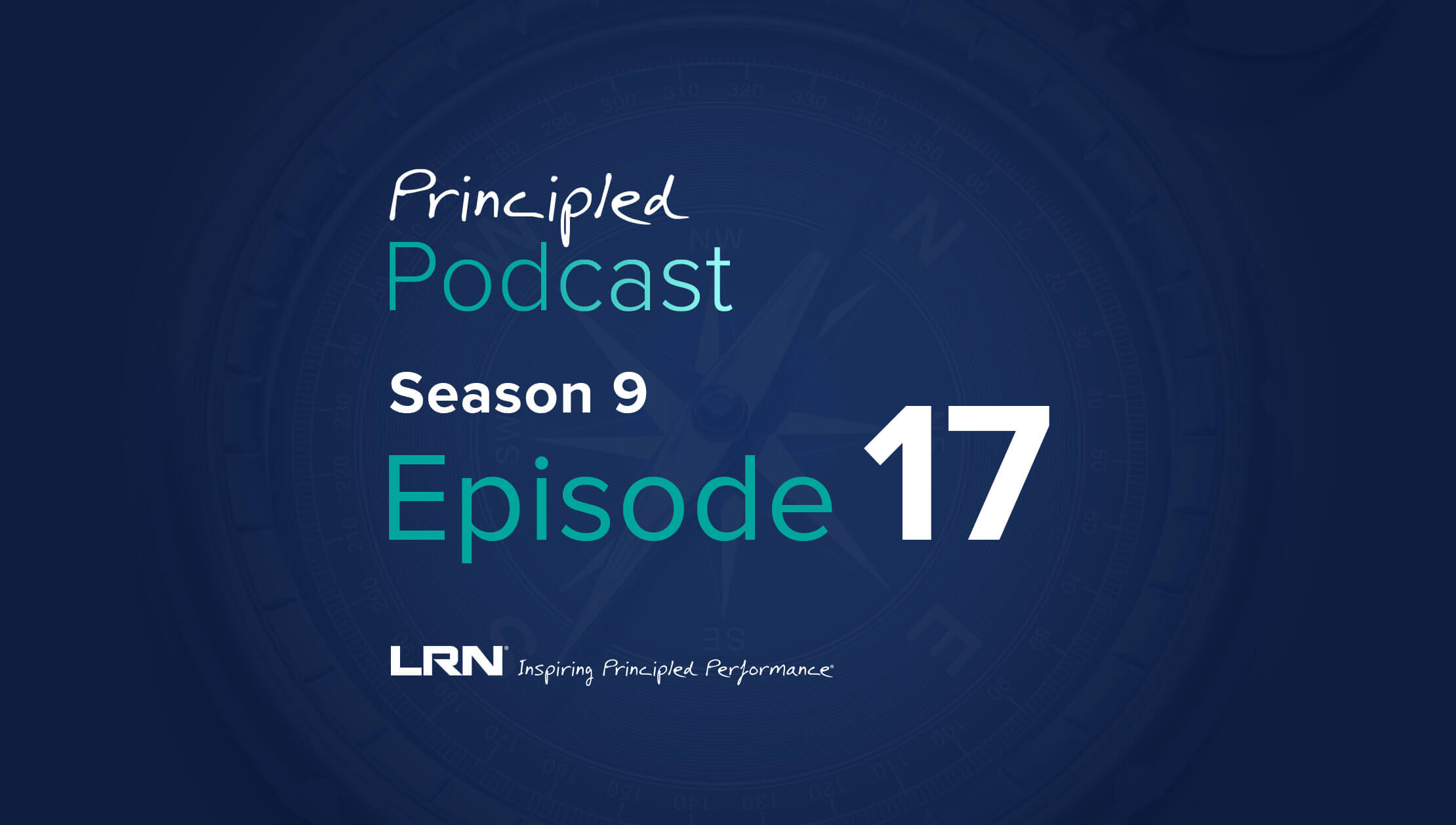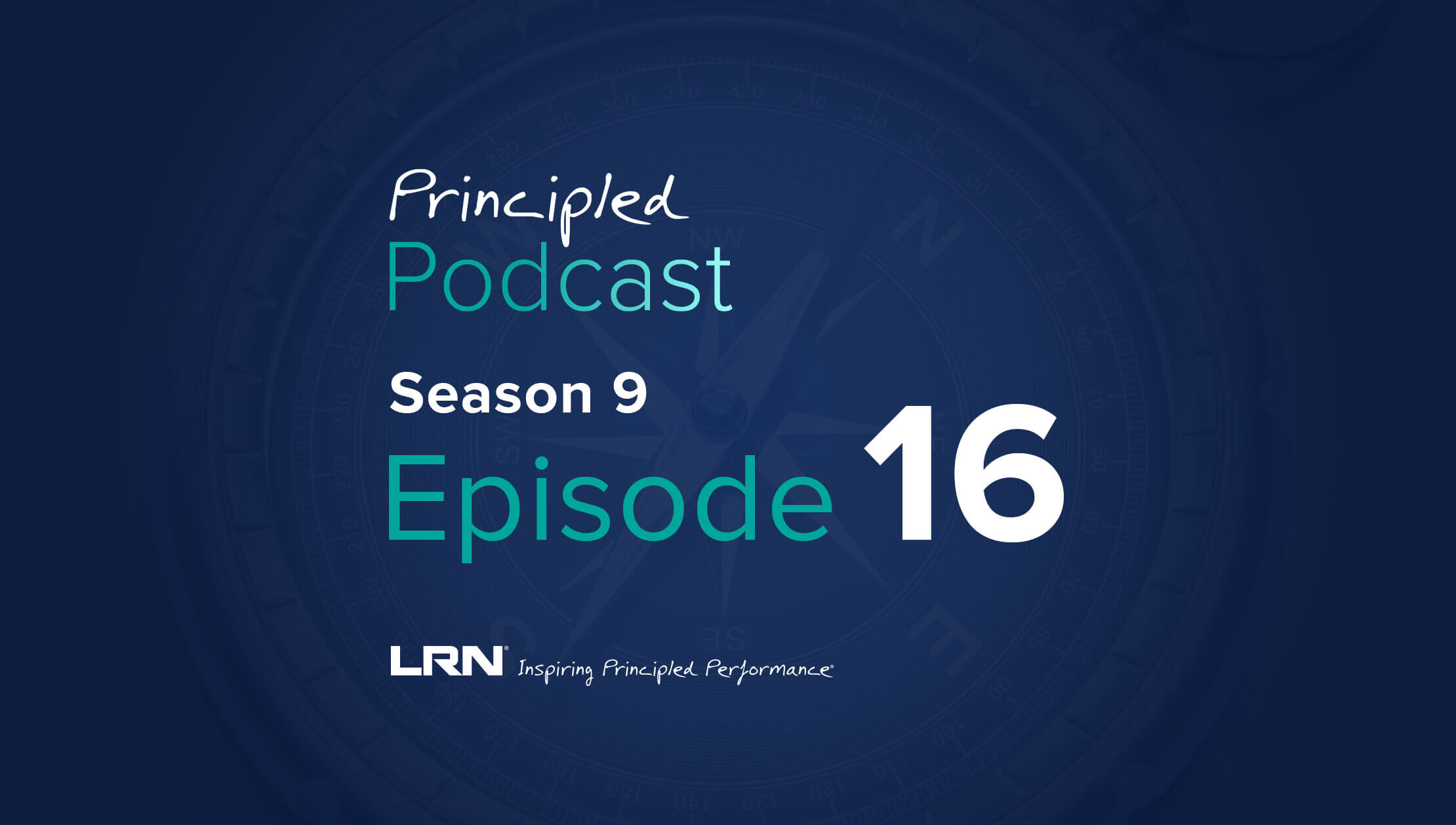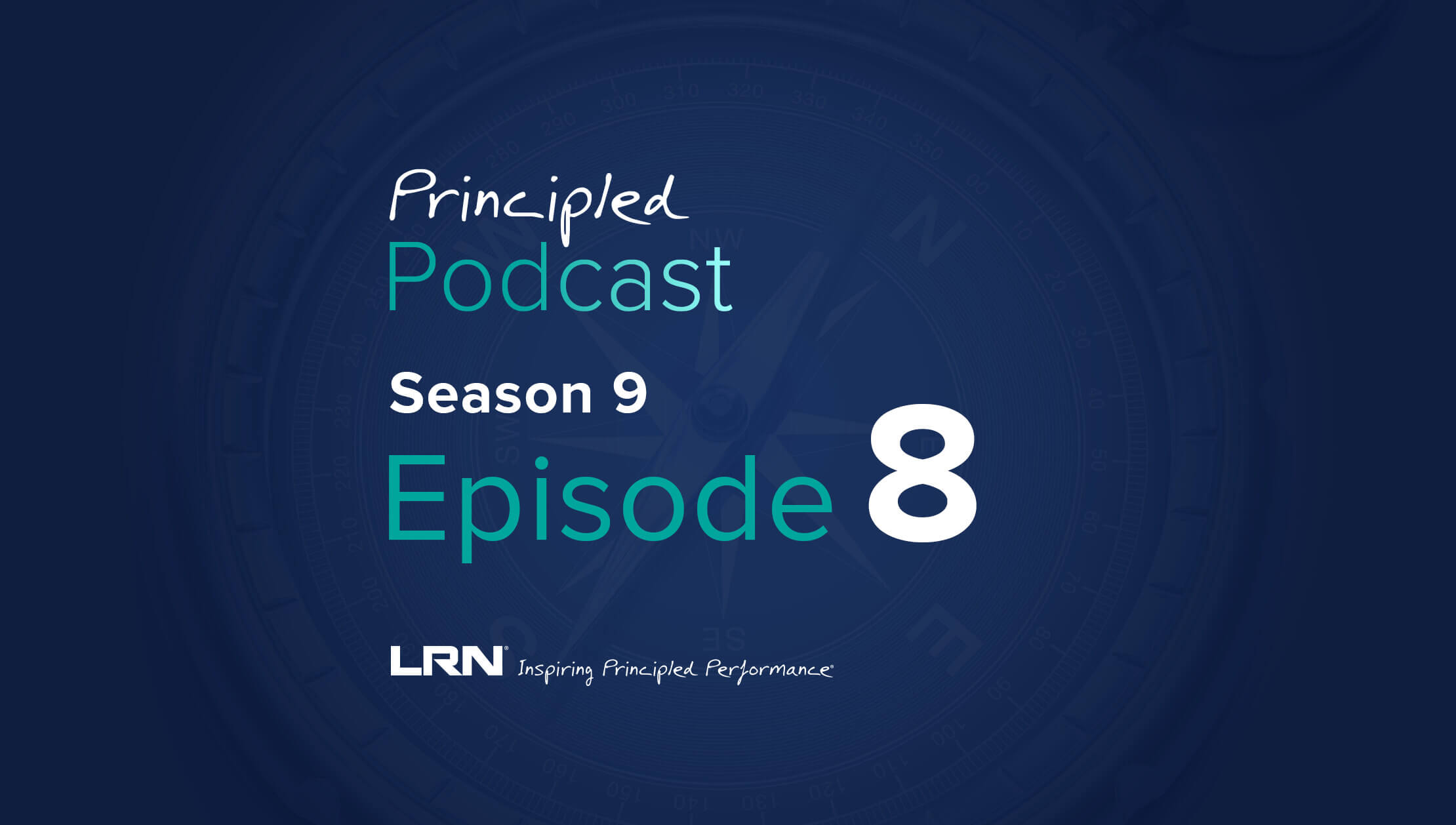LRN Corporation and Tapestry Networks give board members and CEOs tools to build ethical culture—and lift business outcomes—with “Assessing Corporate Culture: A Practical Guide to Improving Board Oversight”
NEW YORK (July 14, 2022) – Available today, a new report provides guidance for board members to improve oversight of company culture, collaborate with executive management to strengthen culture, and drive positive outcomes across key measures of business performance including customer satisfaction, employee loyalty, innovation, and growth.
Assessing Corporate Culture: A Practical Guide to Improving Board Oversight reflects insights from nearly 40 directors and executives representing more than 60 public companies, including some of the largest companies in the world with McKesson, Coca-Cola, and Sony among them. The report serves as a roadmap for board members, CEOs, and c-suite executives to gain a clearer picture of their company’s ethical culture and determine how to improve it throughout the enterprise. As identified in research from study sponsor LRN Corporation, companies with the strongest ethical cultures outperform others by up to 40% across key metrics, making corporate culture a crucial component of business success.
The Assessing Corporate Culture framework was created with the input of sitting public company directors and executives as a part of the Ethics, Culture, and Compliance Network (ECCN) Culture Measurement Working Group and compiled by LRN and Tapestry Networks. Developed as a peer reviewed framework, over 70% of contributors are independent directors, half of whom are current or former chief ethics and compliance officers. This is the second collaboration between Tapestry Networks and LRN, who released the 2021 report, Activating Culture and Ethics from the Boardroom. The earlier report summarized feedback about corporate culture from 40 directors occupying 80 seats on public company boards with a combined market cap in excess of $4.8 trillion, operating on six continents. The new report expands on that work and aims to provide a practical framework that can break through the complexity and implicit dimensions of culture that make it challenging to oversee.
Five key considerations for boards include:
- Prioritize culture on the board agenda - Ensure that executives know that board members want to know about issues and understand problems early. Board members need to request direct information and should dig deep to get it.
- Challenge the board’s culture - Foster a sense of community and speak up culture to ensure that senior management are seen and heard and supported - even if they have a difference of opinion from board members.
- Measure and monitor - Establish data protocols, expand the range of cultural data and benchmark against other companies to maximize the effectiveness of reporting, particularly as measuring and monitoring evolves over the next few years.
- Articulate the desired culture - Break down ethical culture into components to foster concrete conversation partnership with the leadership teams to imprint the aspects of culture board members aspire to achieve.
- Establish clear communication - Boards need to explore who in management owns culture measurement and have the individual report directly to the board.
For a board, the work of defining for itself a “good” culture has more value than being told what a good culture looks like. “Corporate culture is rooted in its values—explicit and implicit—and it is what makes a company stand out,” says Ty Francis MBE, Chief Advisory Officer at LRN. “This study provides a toolkit for board members and CEOs to shape and assess company culture. When boards prioritize ethical culture that alone can influence positive behavior throughout the organization. Leading by example—setting tone from the top—is always a key factor in culture development.”
"As demands from institutional investors, employees, consumers, and shareholders around ESG priorities rise, corporate culture finds itself squarely positioned at the center of enabling long-term impact,” says Dr. Marsha Ershaghi Hames, Partner at Tapestry Networks. “The Ethics, Culture and Compliance network has created a pathway for public company directors and chief ethics and compliance officers to collaborate on developing industry leading practices that can advance meaningful change. This framework provides a pragmatic set of peer-reviewed, pressure tested questions that boards and management teams can leverage to lead sustainable, measurable change.”
With this framework, directors can begin engaging leadership and steering next steps with a set of compelling questions.
Conversation starters include:
-
How can we ensure that culture—especially ethical culture—gets adequate time and attention from the board?
-
Does our culture encourage management to share difficult truths with us? How open to debate and disagreement is our board—both among ourselves and in our interactions with management?
-
How do the CEO and the board respond to ethics or compliance setbacks when you raise them?
-
Do you have a clear understanding of the cultural outcomes we are trying to achieve? Are you measuring against those outcomes?
-
What cultural measurement tools are you currently using? What are the key sources of data you use to measure ethical culture? Are you able to compare cultural data to benchmarks and trends?
To learn more, register for free access to the full report at LRN.com.
About Tapestry Networks
Founded in 2003, Tapestry Networks exists to help leaders of the most important institutions in the world do their work more effectively and with greater confidence. Each year, hundreds of independent directors and senior executives participate in our networks and research initiatives, representing large, global companies from North America and Europe. Our networks and research projects are rooted in candid views from top leaders about the realities of leading the world’s largest and most complex firms. Learn more at tapestrynetworks.com and follow on Twitter and LinkedIn.
About LRN Corporation
LRN’s mission and purpose is to inspire principled performance and help people around the world do the right thing. Since 1994, LRN has worked to propel organizations forward with the partnership, knowledge, and tools to build ethical culture. More than 1,000 companies and 30 million learners worldwide utilize LRN services and take LRN e-learning courses to help navigate complex regulatory environments and foster ethical, responsible, and inclusive cultures. In partnership with LRN, companies translate their values into concrete corporate practices and leadership behaviors that create sustainable competitive advantage. By acting upon shared values, companies and their people find the means to outbehave and outperform. Learn more at https://lrn.com and follow on Twitter, LinkedIn, and Facebook.
For more insights from LRN on ethics, compliance, corporate culture, and reputation subscribe to our newsletter.



